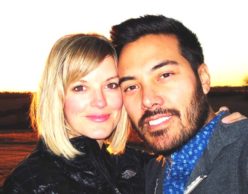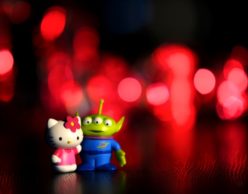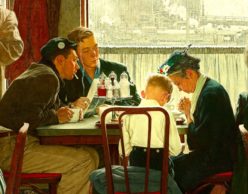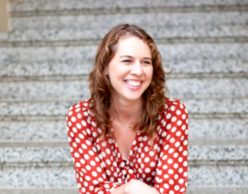Mira Jacob on Arranged Marriage, Jewish In-laws, and Tabla
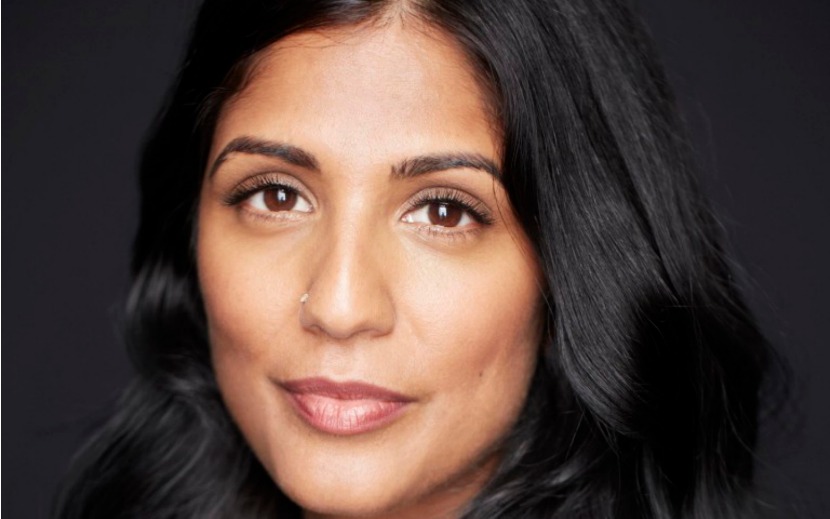
Mira Jacob, author of this summer’s astonishing The Sleepwalker’s Guide to Dancing, has blasted her way into the literary canon with an epic novel about an Indian family grappling with grief, secrets, love, and life as they make their way through this American life in New Mexico. Now living in Brooklyn, Jacob sat down with The Mash-Up Americans to talk arranged marriages, cultural identity, and why she’s probably not the next Jhumpa Lahiri (not that there’s anything wrong with that).
The Mash-Up Americans: Let’s talk about names. What’s your maiden name?
Mira Jacob: Mira Jacob is my maiden name. I’m Syrian Christian, so it always fools people. My husband is Jed Rothstein. It’s funny because when his parents’ friends found out that he was marrying someone named Mira Jacob, they said, “Oh, a nice Jewish girl!” My parents came over in the late 60s from Kerala. I grew up in New Mexico. And it’s like, Oh, you have no idea.
Oh man. Does everybody make assumptions about your name, like I just did?
The thing about Syrian Christianity is that it started in India in 50 AD. But there’s this assumption that it came over with the British and colonization. My family really bristles that. Like, we were Christian when you people were still chasing Odin around the woods! It’s a point of pride with our brand of Indian.
You’ve written beautifully about your parents’ arranged marriage. When did you find out it was arranged?
When I was little. I remember understanding that there were love and arranged marriages. And love marriage to me sounded like a rock ‘n roll version of marriage. I’d watch all my friends’ parents, and think, That’s a love marriage for SURE.
Did your parents want you date and marry an Indian?
The good thing about my parents is that we were so far away from any other Indians they didn’t have that mindset, whereas I think when there’s a big Indian community, you can fall into that. They weren’t like “You must date Indians,” because that would have meant dating my brother. The first person that ever took an interest in me was an African-American guy in high school. Everyone said we should date because we looked so good together. I mean, because we’re kind of the same color? He was mixed race, half white and half African American – but at that point, the white kids were the ones who set the rules on who was black, and he was black.
What did your parents think of you dating a black guy?
They were okay with it, but they were pretty worried about what my grandfather would think of it when he came to visit because Indians can be notoriously racist. My best friend, Laura, was white. My boyfriend was half black and half white. And when my grandfather saw him, he said, “Oh! Laura’s brother!” And my dad was like, “I guess there’s Indians and everyone else.”
That attitude is probably true for a lot of people. So, were they were fine with you marrying a Jewish man?
Jed is actually from my hometown. New Mexico is its own country in America. My parents were so happy with the fact that I was marrying a New Mexican, they thought, Okay, you’re marrying one of us. I felt that way as well. Also, I was 31 when I got married, and they were just relieved that someone was going to marry me.
Do you seek connection with an Indian community?
I’m a writer. In writing, you have to have a point of view. For a long time I didn’t write about my experiences because I felt I didn’t know enough about being American, or about being Indian. And at some point, I accepted that I just know what I know. I take my son back to India to meet his relatives and I think about how when that generation dies, he won’t really have a connection to the culture the way I do.
But I don’t feel the same sort of longing for an Indian community that maybe my parents did, because my community, the family that I’ve gone in for, is the creative community of Brooklyn. That’s the family that I’ve decided to make. I need people to understand my lifestyle and my ideas and the way that I’m going to bring up my kid. And I get that from the multicultural Brooklyn experience.
We think a lot about authenticity and the question that you raised, of “Are you American enough” or “Are you Indian enough.” Does that concern you with your son? Is there a way to be both?
Trying to hold on to your identity is like trying to hold on to a pile of sand — you are always losing it. And sure, that’s terrible. But lately, I’ve been paying more attention to the fact that the sand that you lose still exists somewhere. It’s still there, right? It’s just looks different. And that shape is interesting on its own terms. Our parents are in such mourning for what they lost, and that’s what translates into longing for us, as first-generation kids. But that’s not the only way into the cultural conversation, and that won’t be true for our kids.
So tell us about your kid. We agonize about names at Mash-Up. Zakir Rothstein is a big name for a Christian Indian woman with a Jewish sounding name and her husband Jed Rothstein.
I told Jed, listen, he’s gonna have your last name, he should have a name that locates him as Indian, from me. One of my favorite names has always been Zakir, after Zakir Hussein, who was a rock and roll tabla player when I was young. He toured with Neil Young and Pearl Jam and represented to me the ability of Indians to be rock stars. However. It’s a Muslim name. And the majority of Zakirs in the world are from Pakistan. So I chose an Indian name that’s not even of my culture.
When we told my mother-in-law that we were going to give him an Indian name, she said “Okay, just be sure not to give him a name that sounds like a terrorist.” Like, great! Thanks. To her credit, when she says stuff like that I immediately say something and she’s great about it and understands why it’s wrong. So Jed calls them up after our baby is born and tells them his name. They go and look it up and the first definition of “Zakir” that comes up in Google is “eulogizer of Allah.” We didn’t think about the fact that the internet was going to give our Jewish relatives heart palpitations.
What is the best part of being in a mash-up marriage?
When you’re both to the side of mainstream culture, you learn that you have to scramble and find solutions that other people wouldn’t necessarily have to look for. There’s a natural curiosity that we both have because of it.
The most challenging?
I think it’s the incidental racism, which is not always worth discussing because it’s not worth disrupting the whole familial relationship. For example, we got married right after “Monsoon Wedding” came out, and Jed’s family kept coming up to us and asking, “Is this going to be like Monsoon Wedding?” And I’m thinking, What are you looking for? Indians jumping out of cakes? Want elephants running through? Need rose petals thrown at you? What is going to make this feel like enough of a party to you for you to feel like you’ve had an ethnic experience?
And they’re like, Is it rude for us to say that? YES, IT IS. I’m having a wedding, not something for your entertainment. And also, we’re in New Mexico. So let’s go with desert wedding.
We love desert weddings! What one piece of advice would you give to Mash-Ups navigating their in-laws?
Understand and expect that they will say something wholly damaging to your identity and that even in that, there is no point at which you should give up on your relationship. That ugly moment is going to happen and it still doesn’t mean the game is over. My in-laws, for example, are hard, but they’re really good. After I had Zakir, my in-laws went on a trip to India because they just wanted to understand where their grandson was partially from. That was the greatest gift that they could have ever given me. And they wanted to learn a little bit more about him, because they love him, and their love for him was even deeper after their trip. It was amazing.
What else is amazing are your book reviews, all of which are glowing, and all of which compare you to Jhumpa Lahiri. How does that make you feel?
It’s funny because it started with one review that was like, “Comparisons to Lahiri are inevitable.” Then the next one was like, “There have been comparisons to Lahiri.” And next one was “She’s no Lahiri!” And I just thought, you’re talking in a vacuum to yourselves. On the one hand, great! She’s a great writer, and I’m thrilled at the comparison. On the other hand, I have about in much in common with Lahiri stylistically as I do with Woody Allen, and maybe more with Woody Allen. But what are you going to do?
Before you wrote your book, did you feel there were characters and stories in the world that reflected you?
Some of Junot Diaz’s characters. Danzy Senna’s story in Caucasia. But the reason I wrote this book was that I didn’t see the kind of Indians in literature that I knew everywhere. The Indians that are doing drugs and cursing and living life and having these outlandish American moments. I didn’t see them anywhere and I wanted to write them.


